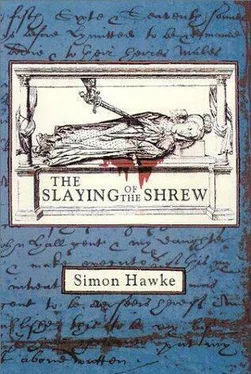Simon Hawke - The Slaying Of The Shrew
Здесь есть возможность читать онлайн «Simon Hawke - The Slaying Of The Shrew» весь текст электронной книги совершенно бесплатно (целиком полную версию без сокращений). В некоторых случаях можно слушать аудио, скачать через торрент в формате fb2 и присутствует краткое содержание. Жанр: Исторический детектив, на английском языке. Описание произведения, (предисловие) а так же отзывы посетителей доступны на портале библиотеки ЛибКат.
- Название:The Slaying Of The Shrew
- Автор:
- Жанр:
- Год:неизвестен
- ISBN:нет данных
- Рейтинг книги:5 / 5. Голосов: 1
-
Избранное:Добавить в избранное
- Отзывы:
-
Ваша оценка:
- 100
- 1
- 2
- 3
- 4
- 5
The Slaying Of The Shrew: краткое содержание, описание и аннотация
Предлагаем к чтению аннотацию, описание, краткое содержание или предисловие (зависит от того, что написал сам автор книги «The Slaying Of The Shrew»). Если вы не нашли необходимую информацию о книге — напишите в комментариях, мы постараемся отыскать её.
The Slaying Of The Shrew — читать онлайн бесплатно полную книгу (весь текст) целиком
Ниже представлен текст книги, разбитый по страницам. Система сохранения места последней прочитанной страницы, позволяет с удобством читать онлайн бесплатно книгу «The Slaying Of The Shrew», без необходимости каждый раз заново искать на чём Вы остановились. Поставьте закладку, и сможете в любой момент перейти на страницу, на которой закончили чтение.
Интервал:
Закладка:
“There has been no error, Master Shakespeare, I assure you,” Granny Meg said calmly. “Hear me out before you rush to judgement of me. The potion I had mixed at the woman’s own request has, by your own report, produced precisely the result that was desired.”
“Good God!” he said. “Are you saying that Catherine Middleton wanted to kill herself?”
“No. Far from it. She had the best reason in the world to want to live. But she wanted to produce the illusion that she did not. She asked me if I could prepare a potion that could, for a certain length of time, produce the appearance of death, and yet not bring it about. I hesitated to perform the task she asked of me, and warned her that such a ruse was not without its dangers, but she and your friend who brought her to me both beseeched me, and said it was the only chance she had to avoid a life of hopeless misery.”
“You said that a friend of mine had brought her to you?” Shakespeare said. “What do you mean? Which friend?”
“Why, the one you brought to see me once before,” Granny Meg replied. “Young Mistress Darcie.”
“ Elizabeth?”
“Aye, she is the one who brought her to me.”
“Then you mean to say that Catherine Middleton is not truly dead, but merely in a sort of morbid slumber?”
“Her heart still beats, but so weakly that one may not easily discern it,” Granny Meg replied. “And she still breathes, but only barely, and to all outward appearances seems not to breathe at all. She will lie thus for at least a day or more, and then she will awake as if from an ordinary slumber, and should be no worse for wear.”
“But… the funeral…” Shakespeare said.
“I was assured that there would be no burial,” said Granny Meg, “but that she would be laid to rest within her family vault, where she could sleep in safety until the effects of the potion had worn off.”
“Of course!” said Shakespeare. He remembered then Elizabeth ’s insistence that the funeral should take place as soon as possible, while the guests were still assembled, so that Catherine could be laid to rest inside the family vault, the better to ease her father’s grief… and aid in the deception. “So there has been no murder after all!”
“And yet,” said Granny Meg, as she reached out slowly and picked up the flask, “I have a strong presentiment of death.” Her brow was deeply furrowed and her eyes had an unfocused, distant look. “Something is very wrong. I see death where there should be no death.” She looked at him. “Go back,” she said. “And ride with all due haste. Death comes; there is no time to waste.”
7
The news of the bride’s death had cast a pall over the festivities, but not quite to the extent that Smythe might have expected. For one thing, rather to his surprise, it had not brought the festivities to an end. Quite the contrary, it seemed to add a morbid stimulation to them. Instead of offering their condolences to their host, or at least sending them through servants and then leaving quietly, as Smythe had expected most of them to do, the guests had all, without exception, chosen to remain, no doubt out of curiosity to see what would develop and because there was still a fair they could attend, with the added spice of new rumors and gossip to exchange.
None of the merchants had packed up and left, mainly because no one had told them to go and the fair was still on so far as they were concerned. There were still good profits to be made and they continued to do a brisk business as the day wore on. When Godfrey Middleton’s steward came out to announce formally that Catherine’s funeral would be held that very afternoon, and that banqueting would follow for the guests, then anyone who might have considered leaving chose instead to stay. As Shakespeare had remarked wryly just before he left for London, “ ‘Tis thrift, Tuck, thrift. The baked meats of the wedding feast shall now coldly furnish forth the tables for the wake.”
Smythe thought that was rather cold of his friend to make the observation in such bitter terms, yet he had to admit that it was accurate. His eldest daughter had just apparently been murdered on the very day of her wedding, and Godfrey Middleton, however distraught he might have felt, was nevertheless allowing the fair to continue. Was it because he had already made a commitment to the merchants, who had indeed gone to some trouble and expense to come out to Middleton Manor from London, or did he have more mercenary motives because he would, as owner of the grounds on which the fair was held, pocket a percentage of the merchants’ profits?
“If ‘twere my daughter,” Smythe said to Sir William, “I would have shut down the fair and asked everyone to leave, albeit kindly, so that I could be left alone with my grief. Instead, the fair proceeds as planned, even with Catherine lying dead upstairs in the house.” He shook his head. “I simply cannot see how Middleton can continue with it.”
“ ‘Tis said the rich are different, Tuck,” Sir William replied, “and having started out in life quite poor, I have seen both sides of fortune, good and ill. There is, indeed, a lot of truth to what they say. A poor man may not have a rich man’s luxuries, but then neither does he have his obligations. And while ‘tis true that money may beget more money, ‘tis also true that it takes money to maintain money. Godfrey Middleton is a rich man, but his estate is frightfully expensive to keep up, as is his business and his home in London, too. All must be staffed, provisioned and supplied, and otherwise maintained. There are many people who depend upon him for their livelihoods. Just because a man is rich, Tuck, does not mean that he is without care or duty.”
“I can see your point, Sir William,” Smythe replied. “And yet, I still cannot help but think that there are times when a man can simply be past caring, and when duty can just be damned.”
Worley nodded. “I can see your point, as well, lad. And ‘tis well taken, too. For my own part, I have no children, so I cannot say for certain that I know how I would feel were I in Godfrey’s place. But I have known what it is to love, and then to lose that love, and if such pain can in any measure be akin to the pain of a lost child, then I believe that I would feel much the same as you.”
Smythe glanced at Sir William briefly, but Worley seemed to be looking off into the distance somewhere. Smythe had never before heard Sir William speak of any romances in his past. Indeed, there was much about Sir William Worley’s life he did not know- although in some respects, he knew a great deal more than most- and it would have been much too presumptuous of him to ask.
“Howsoever that may be,” Worley continued, “it serves our purpose that the fair has not closed down and the guests have not been asked to leave, for we can now proceed to run our murderer to ground.”
“Or murderers, if there be more than one,” said Smythe, mindful of the two men whose plotting he had overheard.
“Indeed,” said Worley. “And the first order of business shall be to inform Godfrey Middleton of how things stand. That, I fear, must be my sad duty to perform, as he is my friend and neighbor.”
“And yet, he is your rival,” Smythe observed.
“That, too. However, truth be told, ‘tis a rivalry more keenly felt by him than me. I am aware of it, of course, but I do not pay it any mind. I know he envies me my privilege of playing host to Her Royal Majesty each year when she sets out for her progress through the country, but I shall tell you frankly-and in strict confidence, mind you-that ‘tis a privilege I would gladly cede to him. Her Majesty alone can be a handful at the best of times, but together with her sycophantic pilot fish at court, she becomes much more of a vexation than a privilege. Each year, I play the gracious host to them and spend a small fortune on their entertainment. And each year after they have gone, it takes yet another small fortune to clean up the mess they leave behind. If Godfrey wishes to contend with that, believe me, he is more than welcome.”
Читать дальшеИнтервал:
Закладка:
Похожие книги на «The Slaying Of The Shrew»
Представляем Вашему вниманию похожие книги на «The Slaying Of The Shrew» списком для выбора. Мы отобрали схожую по названию и смыслу литературу в надежде предоставить читателям больше вариантов отыскать новые, интересные, ещё непрочитанные произведения.
Обсуждение, отзывы о книге «The Slaying Of The Shrew» и просто собственные мнения читателей. Оставьте ваши комментарии, напишите, что Вы думаете о произведении, его смысле или главных героях. Укажите что конкретно понравилось, а что нет, и почему Вы так считаете.












